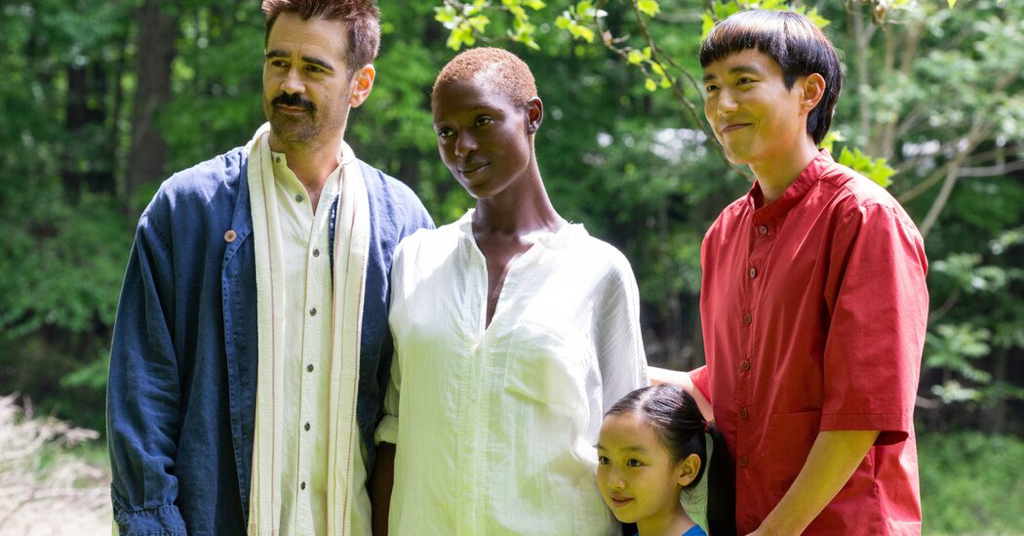Evan D.Loss is a strange experience. Someone, or something close to you is suddenly gone, their existence extinguished and, yet, they still occupy the minds and stories of everyone who ever knew them. The life of a lost one “can keep unfolding itself to you” as Mr. McCarthy tells a grieving Greg in Me and Earl and the Dying Girl. But what if the lost love one isn’t a person and what if all their memories could be explored, like a diary for those left behind. These ideas set the stage for Kogonada’s After Yang. Jake (Colin Farrell) and Kyra (Jodie Turner-Smith) are the young parents of an adopted Chinese daughter, Mika (Malea Emma Tjandrawidjaja). Feeling unable to provide Mika with tangible connection to her culture and roots, the couple also purchased Yang (Justin H. Min), a humanoid artificial intelligence around the same time to serve as an older sibling, babysitter and link to her heritage all in one. Many years have passed since then and Yang is wholly part of the family, not only relied upon, but deeply cared for.
Not to say that Jake and Kyra view Yang as their son in his own right — they both have an understanding of the role he plays in their lives — but he does share meals with them and participate in family dance competitions. During one of those very dance contests, the techno-sapien — as these androids are known — begins to malfunction. While shocking to Mika, the adults see Yang as simply a piece of machinery needing repair. It isn’t so cut and dry though, Yang was purchased second hand, from a store now out of business. The beloved android cannot be repaired nor replaced as Jake originally planned. Scrap dealers and museums both have interest in the husk of Yang and all that’s left for his former family is a trove of recordings, a lifetime of quasi-memories stored in the hard drive of this quasi-person. Anyone who saw Kogonada’s wrenching debut Columbus will already know that they’re in for a meditative journey in this follow up, but After Yang takes that pointed curiosity in a number of interesting directions. In the pristine stillness of a house quieted by grief, the vacant corners fill with abstracted memories that force Jake to grapple with the idea of what it means to be alive and the enigmatic pain of something that doesn’t neatly fit that distinction. With Columbus, Kogonada used his staid camera to show the imposition of structures, here he uses those empty spaces to highlight the absence of a presence once taken for granted. As Jake parses the unseen corners of Yang’s mind he begins to see an outside perspective of his own life. Yang may not have been a man born of woman, like Jake, but his memories are raw and revelatory for his adoptive family. Jake gets to see the not only the nuance of Yang’s perspective on their interactions, but the life his android held when the family was away. Programmed to be nothing more than a tutor or babysitter, Yang broke free to find a life his own, even finding romance with a barista in town. As much as After Yang explores the idea of how much humanity is owed to non human entities — be them artificially intelligent or non-human life — it also probes the unseen lives of those we hold closest. How much would we each value a look into the memories and emotions of someone we love? To experience the little moments of their life that eluded our perception? As someone who has recently lost a loved one I almost envied Jake’s ability to go back and relive his time together with Yang. We often think about people in the context of our relationships with them; the way our grandmother spoiled us, how our friend made us laugh, the uncanny way a parent always knew when something was wrong. In reality, everyone we ever cared for had or will have lives of their own that we’ll never know. Our parent’s lived a lifetime before we were even a twinkle in their eye, our children will live lives long after we’re gone. After Yang opens up that concept to a cinematic degree. Yang isn’t a father or a son though, he’s a robot, designed to execute a certain purpose and nothing more. His life beyond that was never supposed to exist, but that it did begs a great deal of questions. As we drive toward a future with more and more advanced intelligence, their capacity to feel is going to become one of the most pressing questions of that era. Given our treatment of actually humans and even animals doesn’t give me confidence. But After Yang doesn’t litigate that question as much as inspire it. In all these ways, After Yang is more contemplative than prescriptive, but the thoughts it inspires are profound. Rare is a movie that so beautifully crushes its viewer, but Kogonada has managed it twice. This is a film that begs countless queries of its audience without ever demanding answers. Its far more interested in drawing you into the journey of one family, and specifically one man, experiencing a shocking loss. Colin Ferrell — in a career best performance — masterfully internalizes that, balancing his quiet pain with his need to be strong for the members of his family still living. It’s not exaggeration to say that After Yang is already a lock for one of the best films of this year. It’s also not surprising to anyone who was steamrolled by Columbus. Subtle yet wholly overwhelming, this is a film that begs to be seen by anyone who has ever experienced loss and to live on for all of those that inevitably will. 9/10
Comments
|
Categories
All
Archives
April 2024
|
